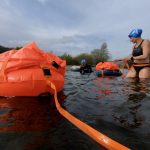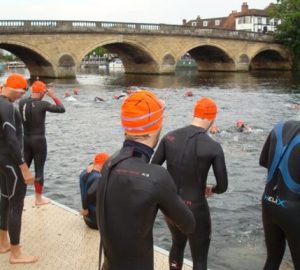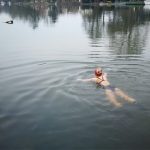Kevin Murphy Interview
Outdoor Swimmer talks to marathon swimming legend Kevin Murphy about injury, mentoring and his ambition for one more English Channel crossing.
First published in H2Open Magazine, Feb/Mar 2017
For a man who has said that he didn’t really enjoy most of his swims, Kevin Murphy has managed to rack up some seriously impressive records in his swimming career. Known as the King of the English Channel, Kevin has 34 English Channel crossings to his name, including three two-ways and three attempted three-ways. His first North Channel crossing stood as the male record for 43 years. He swam Windermere when he was just 15, was the first person to swim around the Isle of Wight and his record for the earliest ever English Channel crossing stood for 26 years before being broken last year. And despite injury, Kevin still hankers after one more English Channel crossing. Read on to find out what makes this marathon swimming legend tick…
It’s now more than 10 years and a lot of shoulder surgery and rehabilitation since you last swam the English Channel. Do you still want to swim it again?
I have a burning ambition to swim the Channel again, to prove to myself that I still can. I now have a replacement joint in my left shoulder – basically a metal ball and socket – but one year on I am back swimming again. At the moment it feels awkward and I am very slow but I was given considerable inspiration by a swimmer who took part in a two-person two-way relay this year. She had a replacement shoulder joint six years ago. It took her two years to come back from it but now she is swimming as good as ever.
Apart from your multiple crossings of the English Channel, which of your swims are you most proud of?
It has to be my first North Channel swim in 1970. My time of 11hrs 21mins was eventually beaten in the 80s by Alison Streeter but it stood as a male record for 43 years.
Are there any swims you wish you could have done but haven’t (yet, maybe)?
I always wanted to do the Cook Strait but time and money never allowed me to pursue it. I did once look at the North Sea (Harwich to the Hook of Holland) but eventually decided that was beyond me. I wish the Oceans Seven had been around 20 years ago. I would have gone after that.
You must have spent a lot of money on swimming over the past 50 years: was it money well spent?
Swimming was my release from the pressure of work. If I hadn’t spent my money swimming it might have been spent in the pub. I don’t regret spending the money but I do regret the impact on my family when my children were growing up. I held down two jobs and was working a regular 70 hours a week to pay for the swimming. I was swim training as well as travelling a lot for work. That inevitably meant I wasn’t at home when maybe I should have been.
Apart from your shoulder, is there any other reason why you might not swim the Channel again?
Age is obviously an issue but it makes me even more determined to prove I still can. My tolerance to cold doesn’t seem to have been affected and fitness is only a matter of working at it. I don’t have any loss of interest. It will scare me when I set off from Shakespeare Beach – but it always did. Of late I have been channelling my efforts into passing on my experience to others, now via the King’s Swimmers Swimcamps. Endurance swimming has been my life and has given me a huge amount. I’d like others to have the chance of doing the same.
You first had shoulder surgery before your 33rd crossing. Did your final two crossings cause additional damage and did you appreciate the risks before you did them? And if so, was it worth it?
Before my 33rd crossing I had rotator cuff surgery on both shoulders to repair damaged tendons. Swimming the channel was a calculated risk and in the event there was no problem. In 2009 I was out on a boat in support of another Channel swimmer. I went in with him for one hour but when it came to getting out the ladder was not fully down and somebody tried to help me by pulling me up by my left arm. The surgery in my shoulder gave way and pulled apart. My surgeon made several attempts to repair the damage but eventually I had to have a replacement shoulder.
You’ve said that you really didn’t enjoy most of your swims, so what drove you on?
I don’t like hurting myself and I didn’t like feeling ill during my swims so, yes, I often hated it while I was in there but I enjoyed the achievement. I enjoyed the challenge. I enjoyed proving to myself what I could do. My mantra while swimming was: “you’ve said you’re going to do this. Now prove it.” The hurt is temporary. The achievement and the knowledge of how far I can push myself lives on and translates into every other sphere of life.
Despite not being able to do any solo Channel swims over the past 10 years you’ve remained very active in the Channel and marathon swimming communities: what are some of the things you’ve done and why?
I’ve always needed focus. I could never train just for the sake of it. I needed a reason. The same thing applies to everything I do. I had a parallel life as a journalist but was made redundant in 2009 at the age of 60. I did not want to sit back and grow old gracefully. I needed a reason for living so I thought: “What are my strengths?” The obvious one was my experience of endurance swimming and I decided I wanted to be a grand old man of the sport – passing on my experience to others. I have been secretary of the Channel Swimming and Piloting Federation (CS&PF) since 2011. On a regular basis I am asked via CS&PF for advice and I am pleased to give it. I enjoy mentoring swimmers at swim camps. I enjoy talking to swimmers in Dover. If I can help or advise, I will.
After a 2-way Channel crossing in 1970
You’ve recently launched The King’s Swimmers Swimcamps: why is that and what is your ‘unique selling proposition’?
For several years I have been the mentor at SwimTrek long distance training weeks in Mallorca but my entrepreneurial spirit kicked in. There was no falling out with SwimTrek but I wanted to do it for myself.
A long time contact, Kathy Batts, who has swum the Channel solo; has done 16 Channel relays; has swum around Manhattan; and is also a former SwimTrek guide, came to me with an idea which has now become the The King’s Swimmers. She has also had a career in first aid and as a lifeguard training instructor and worked as RNlI volunteer crew We were joined by Ian Muir who has swum the Channel three times and has huge professional experience in the safety industry. I think we are able to offer a unique opportunity for swimmers to train. We have huge experience of the Channel and other swims around the world – and of the training required. Our first swim camp was in Menorca at the end of October 2016 and it was a great success. We have three more swim camps planned for April 2017 using the same venues and facilities in Menorca. We also have the knowledge to help organise and facilitate many other swims in Britain and around the world. We trained eight 16-year-old girls from Switzerland, splitting them into two teams of four, both of which swam the Channel this year and then, as an eight-girl team, swam the length of lake Zurich. I went to southern Spain and was support for an American swimmer who successfully crossed the gibraltar Strait. Our aim is to be flexible enough to offer training for all levels of experience from newcomers to the sport to the most experienced whether they be preparing for solos or relays. We never forget that we were ‘newbies’ once. My first swim was half a mile in a river race at Bedford then the three mile BldSA junior Bala.
Why do you think English Channel swimming has become so much more popular over the past 15 years? It is astonishing. The year I first swam the Channel I was one of only seven to do it. In 2016 the CS&PF had 197 solos and relays registered. CSA probably had almost as many. Something has changed in the national psyche over the past 15 years. In the mid-1980s my children’s school knocked down their indoor swimming pool to save money on the upkeep so they could buy computers. I doubt that would happen now. Most of the great open air lidos were closed in the 70s and 80s. Nobody used them. Now they’re what everybody wants. Fitness and getting out into the great outdoors has become a national obsession. Undoubtedly the david Walliams factor had an impact – if a comedian can do it so can I. What people forget is that he was a very good swimmer who happened to be a comedian and there was no joking when it came to his training. People look at me and think: ”If that tubby old bloke can do it, so can I.” I like that. The triathlon factor is another huge reason for the growth of endurance swimming – triathletes looking to get out of their wetsuits and face a new challenge. They’re the sort of people who want new challenges. The interest in wild swimming is another factor. People who enjoy swimming outdoors and wonder what they can achieve.
For more information on The King’s Swimmers see: thekingsswimmers.co.uk







